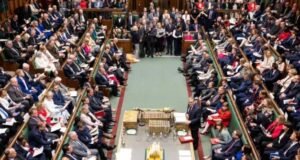Dany Cotton says fire was as unexpected as ‘space shuttle landing on Shard’, even though brigade knew of cladding risks
The London fire brigade commissioner, Dany Cotton, has claimed the ferocity of the Grenfell Tower fire was so unexpected that it was like “the space shuttle landing on the Shard”, even though she conceded that the brigade knew about the risk of cladding fires nine months before the blaze.
Giving evidence in front of a packed inquiry room, Cotton admitted she did not know about an internal fire brigade presentation detailing the risks. Survivors of the June 2017 disaster, which killed 72 people, and the bereaved listened as she also admitted that she did not know about several facade fires around the world that had happened before Grenfell.
The most senior firefighter in London said she had never experienced in her 30-year LFB career the kind of widespread compartmentation failure in a high-rise residential block that happened at Grenfell or received training in spread of fire through cladding or facades, as happened on 14 June 2017.
But the inquiry was shown an October 2016 slideshow prepared by LFB fire engineers and shared among LFB safety officers at the time when Cotton was director of safety and assurance which detailed many such fires and the risks. It was titled Tall Building Facades and showed photographs of cladding fires around the world. It warned “new construction materials and methods of construction are being used in facades and with a limited understanding of their fire behaviour/ performance” and that “there is a need to understand what products are being used in the facade system and their fire behaviour and if they are used appropriately and meet the relevant guidance. These could affect the way fires develop and spread in a building.”
Cotton said she did not see the presentation and said that even since Grenfell she only “looked through it but I’ve not studied it in detail”.
She said she did not know why it was not distributed to watch managers or seen by her.
Richard Millett QC, counsel to the inquiry, asked if that did not “indicate a structural or cultural failure” whereby insufficient attention was being paid to the science of fire safety at the LFB.
She said it did not.
Millett asked: “Was this [Grenfell] not the unexpected which you should be expecting?”
She replied: “I wouldn’t develop a training package for a space shuttle landing on the Shard.”
Cotton insisted repeatedly there was no way firefighters could be expected to know if cladding was flammable and claimed that even if they did know they would not have been able to put the fire out. She insisted it was the responsibility of building inspectors, designers and builders to ensure that buildings performed as they should to allow firefighters to extinguish fires and rescue people.
Earlier she also admitted that she had not read 2014 government operational guidance for fire and rescue authorities about fighting fires in high-rise buildings.
It says: “Combustible material in voids and cavities and poor quality of construction can also contribute to the spread of fire and smoke beyond the compartment of origin.”
She said she knew this and it was something that officers were trained to watch out, but it would be impossible to train officers to recognise poor quality construction.
“We would expect the building to go through several stages of inspection before we come to interact with it,” she said.
The section on familiarisation visits expected to be made by firefighters says: “Information to be gathered should include: building construction features such as … the presence of sandwich panels, timber framing, cladding systems.”
Cotton said she did not know that “specifics around cladding” were expected to be gathered but said it would be “almost impossible” to see what was being used unless it was obvious, like timber.
During the Grenfell fire, Cotton’s role was as monitoring officer which she said meant she was to provide support, guidance and reassurance to the incident commander. One of her operational roles was “to take command and manage major operational incidents as required”, the inquiry heard. She did not take control because she said she was satisfied with the firefighting plan.
Asked about training in incident operational firefighting, she said: “I haven’t actually received training for a while because in the role I am in now … I can’t remember the last time I specifically had training.”
She said she had never experienced widespread compartmentation failure in a high-rise residential block and had no training in spread of fire through cladding or facades. She also said she had never experienced a fire where fire survival guidance calls were being made to 999 from people inside burning buildings. Neither had she ever evacuated residents down a single stairwell.
Her statement to police investigating the fire was published by the inquiry and described how she was asleep when she was alerted to the fire at 2.03am at her home 21 miles away.
She arrived at 2.49am, almost two hours after the fire started. She recalled how she was on the phone to her director of operations, Tom George, who was on holiday in the Caribbean and had called her. She said to him: “What the fuck? This can’t actually be happening; I can’t believe what I’m seeing,” she said. “It just looked like something from a disaster movie. Like a hideous mixture of Towering Inferno and a video I was shown in training school of a high-rise fire in São Paulo where people jumped to escape.”
She said: “I have had issues with my memory, which I believe is linked to the traumatic nature and sheer scale of the incident. I deliberately didn’t write any notes at the time of the incident, because I had such poor recall of the night’s events and I’d hoped they would improve.
“I’m still finding it very difficult to look at visual images and have conversations about Grenfell. I’m still responsible for effectively running the London fire brigade, and everything else that’s involved in that. It would be no good for me to fall apart.”
Don't Miss
- Tk 26 lakh crore looted in name of development: Jamaat Ameer
- No election bid for ICT convicts: Attorney General
- One killed, 11 injured in Sylhet road mishap
- Bangladesh rout Turkmenistan 7-0 to seal spot in AFC Women’s Asian Cup
- Government funding supports borough-wide resurfacing to extend road life and cut carbon emissions
 Weekly Bangla Mirror | Bangla Mirror, Bangladeshi news in UK, bangla mirror news
Weekly Bangla Mirror | Bangla Mirror, Bangladeshi news in UK, bangla mirror news







